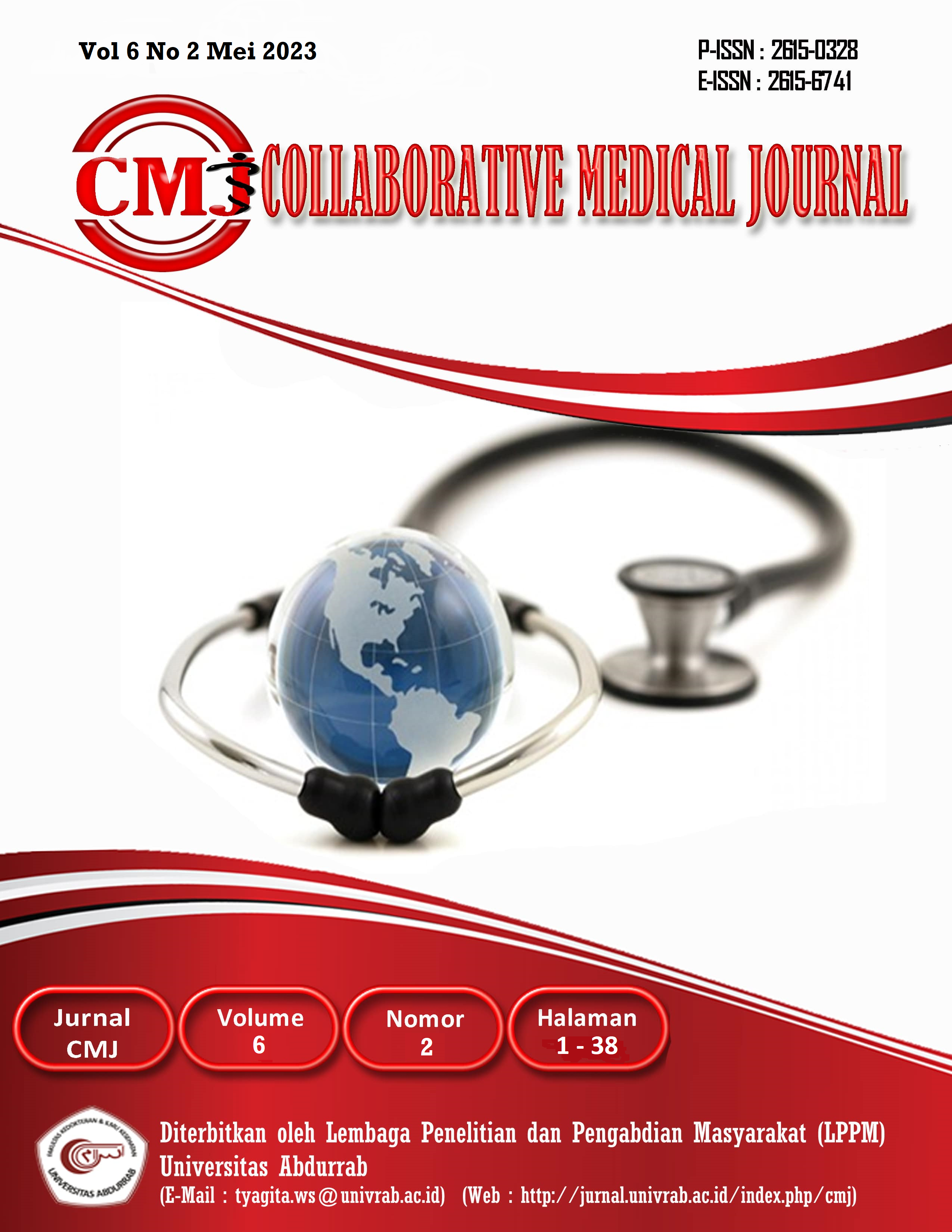PEMBERIAN FEEDBACK SELAMA PEMBELAJARAN ONLINE PADA MAHASISWA FAKULTAS KEDOKTERAN UNIVERSITAS ABDURRAB PEKANBARU
DOI:
https://doi.org/10.36341/cmj.v6i2.3315Keywords:
Feedback, Online Class, Formative TestAbstract
Formative exams aim to improve learning processes and methods. From the data that has been obtained, summative test scores are influenced by formative exams. The purpose of the formative exam is to provide feedback in order to achieve these learning goals. During online learning students of the abdurrab university medical school conduct formative exams on each module. This study aims to find out how the effectiveness of formative exams by providing feedback during online learning to students of the Faculty of Medicine, Abdurrab University Pekanbaru. The method used in the study was quasi-experimental with a posttest only control group design. Sampling techniques by means of total sampling and different tests using Mann Whitney. The results of the study found that there was a significant difference between students' perceptions of formative exams given feedback and without giving feedback to students of the Faculty of Medicine, Abdurrab University Pekanbaru. The results of the correlation test obtained a p value of 0.000. There is a significant difference between students' perceptions of formative exams given feedback and without feedback.
Downloads
References
[2] A. Hutauruk and R. Sidabutar, “Kendala Pembelajaran Daring Selama Masa Pandemi di Kalangan Mahasiswa Pendidikan Matematika : Kajian Kualitatif Deskriptif,†J. Math. Educ. Appl., vol. 02, no. 01, pp. 45–51, 2020.
[3] P. Thangaraj, “Concept of Formative Assessment and Strategies for its Effective Implementation Under Competency-Based Medical Education : A Review,†Natl. J. Res. Community Med., vol. 10, no. January, pp. 016–024, 2021, doi: 10.26727/NJRCM.2021.10.1.016-024.
[4] H. Batool, U. Asim, S. I. A. SHAH, and A. S. CHUGHTAI, “Formative Assessment As a Performance Predictor for Summative Assessment in Undergraduate Medical Students : a Comparative Corelational Analysis in the Subject of Pathology,†Biomedica, vol. 34, no. 3, p. 205, 2018.
[5] S. F. Selegi, “Model Evaluasi Formatif-Sumatif Terhadap Motivasi Belajar Mahasiswa Pada Mata Kuliah Perencanaan Pengajaran Geografi,†no. November, 2020, doi: 10.31219/osf.io/asnjr.
[6] R. H. Darwis, “Efektivitas Pemberian Tes Formatif Dengan Umpan Balik Terhadap Hasil Belajar Statistik Deskriptif,†J. Pendidik. Mat., vol. 1, no. 2, p. 37, 2017, doi: 10.31100/histogram.v1i1.22.
[7] H. Okta, “Penerapan Tes Formatif dalam Pembelajaran Pendidikan Agama Islam di SMPN 1 Pulau Panggung Kabupaten Tanggamus,†Angew. Chemie Int. Ed. 6, pp. 951–952, 2019.
[8] M. I. Sari, R. Lisiswanti, D. Oktaria, B. P. Kedokteran, F. Kedokteran, and U. Lampung, “Pembelajaran di Fakultas Kedokteran : Pengenala bagi Mahasiswa Baru,†J. Kedokt. UNILA, vol. 1, pp. 399–403, 2016.
[9] M. S. Slamet, “Pengaruh Bentuk Tes Formatif Assosiasi Pilihan Ganda Dengan Reward Dan Punishment Score Pada Pembelajaran Matematika Siswa Sma,†Infin. J., vol. 3, no. 1, p. 59, 2014, doi: 10.22460/infinity.v3i1.39.
[10] S. Mohebi, M. Parham, G. Sharifirad, and Z. Gharlipour, “A new method of ‘student‑centered formative assessment’ and improving students’ performance: An effort in the health promotion of community,†no. January, pp. 1–6, 2018, doi: 10.4103/jehp.jehp.
[11] N. Begum, S. Hossain, and M. H. K. Talukder, “Influence of formative assessment on summative assessment in undergraduate medical students,†Bangladesh J. Med. Educ., vol. 4, no. 1, pp. 16–19, 2017, doi: 10.3329/bjme.v4i1.32191.
[12] T. S. Darungan, “Evaluasi Proses Pemberian Feedback di Tutorial Problem-Based Learning di Fakultas Kedokteran,†J. Pendidik. Kedokt. Indones. Indones. J. Med. Educ., vol. 5, no. 2, p. 88, 2019, doi: 10.22146/jpki.25320.
Downloads
Published
Issue
Section
License
1. Copyright of all journal manuscripts is held by the Collaborative Medical Journal (CMJ)
2. Formal legal provisions to access digital articles of electronic journal are subject to the provision of the Creative Commons Attribution-ShareAlike license (CC BY-NC-SA), which means that Collaborative Medical Journal (CMJ) is rightful to keep, transfer media/format, manage in the form of databases, maintain, and publish articles.
3. Published manuscripts both printed and electronic are open access for educational, research, and library purposes. Additionally, the editorial board is not responsible for any violations of copyright law.
licensed under a Creative Commons Attribution-ShareAlike 4.0 International License.





